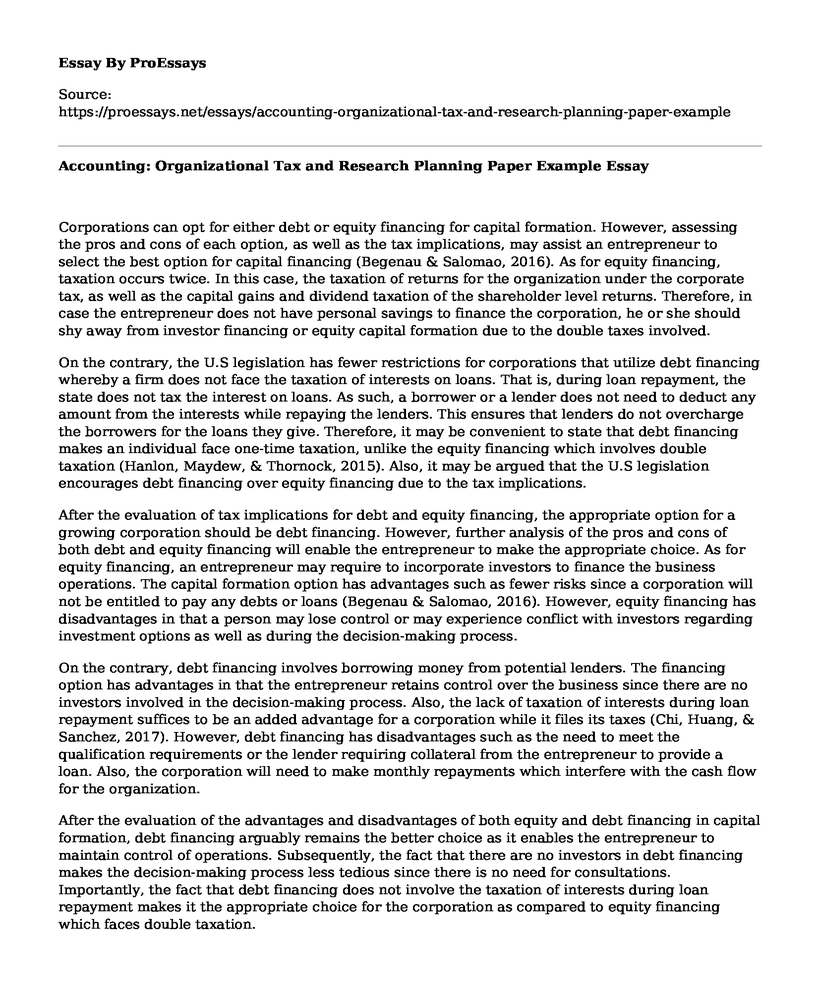Corporations can opt for either debt or equity financing for capital formation. However, assessing the pros and cons of each option, as well as the tax implications, may assist an entrepreneur to select the best option for capital financing (Begenau & Salomao, 2016). As for equity financing, taxation occurs twice. In this case, the taxation of returns for the organization under the corporate tax, as well as the capital gains and dividend taxation of the shareholder level returns. Therefore, in case the entrepreneur does not have personal savings to finance the corporation, he or she should shy away from investor financing or equity capital formation due to the double taxes involved.
On the contrary, the U.S legislation has fewer restrictions for corporations that utilize debt financing whereby a firm does not face the taxation of interests on loans. That is, during loan repayment, the state does not tax the interest on loans. As such, a borrower or a lender does not need to deduct any amount from the interests while repaying the lenders. This ensures that lenders do not overcharge the borrowers for the loans they give. Therefore, it may be convenient to state that debt financing makes an individual face one-time taxation, unlike the equity financing which involves double taxation (Hanlon, Maydew, & Thornock, 2015). Also, it may be argued that the U.S legislation encourages debt financing over equity financing due to the tax implications.
After the evaluation of tax implications for debt and equity financing, the appropriate option for a growing corporation should be debt financing. However, further analysis of the pros and cons of both debt and equity financing will enable the entrepreneur to make the appropriate choice. As for equity financing, an entrepreneur may require to incorporate investors to finance the business operations. The capital formation option has advantages such as fewer risks since a corporation will not be entitled to pay any debts or loans (Begenau & Salomao, 2016). However, equity financing has disadvantages in that a person may lose control or may experience conflict with investors regarding investment options as well as during the decision-making process.
On the contrary, debt financing involves borrowing money from potential lenders. The financing option has advantages in that the entrepreneur retains control over the business since there are no investors involved in the decision-making process. Also, the lack of taxation of interests during loan repayment suffices to be an added advantage for a corporation while it files its taxes (Chi, Huang, & Sanchez, 2017). However, debt financing has disadvantages such as the need to meet the qualification requirements or the lender requiring collateral from the entrepreneur to provide a loan. Also, the corporation will need to make monthly repayments which interfere with the cash flow for the organization.
After the evaluation of the advantages and disadvantages of both equity and debt financing in capital formation, debt financing arguably remains the better choice as it enables the entrepreneur to maintain control of operations. Subsequently, the fact that there are no investors in debt financing makes the decision-making process less tedious since there is no need for consultations. Importantly, the fact that debt financing does not involve the taxation of interests during loan repayment makes it the appropriate choice for the corporation as compared to equity financing which faces double taxation.
References
Begenau, J., & Salomao, J. (2016). Firm financing over the business cycle.
Chi, S., Huang, S. X., & Sanchez, J. M. (2017). CEO inside debt incentives and corporate tax sheltering. Journal of Accounting Research, 55(4), 837-876.
Hanlon, M., Maydew, E. L., & Thornock, J. R. (2015). Taking the long way home: US tax evasion and offshore investments in US equity and debt markets. The Journal of Finance, 70(1), 257-287.
Cite this page
Accounting: Organizational Tax and Research Planning Paper Example. (2022, Sep 15). Retrieved from https://proessays.net/essays/accounting-organizational-tax-and-research-planning-paper-example
If you are the original author of this essay and no longer wish to have it published on the ProEssays website, please click below to request its removal:
- Essay Sample on Pease Itemized Deduction
- Evolution of FABS's Conceptual Framework Essay
- Jones Memorial Hospital Case Study
- Auditing-Internal Control - Essay Sample
- Banks Embracing Technologies: Investment & Benefits - Essay Sample
- Essay on Gentrification in Philadelphia: Increased Rental Prices, Property Taxes & LOOP Tax Relief
- A Response Paper







